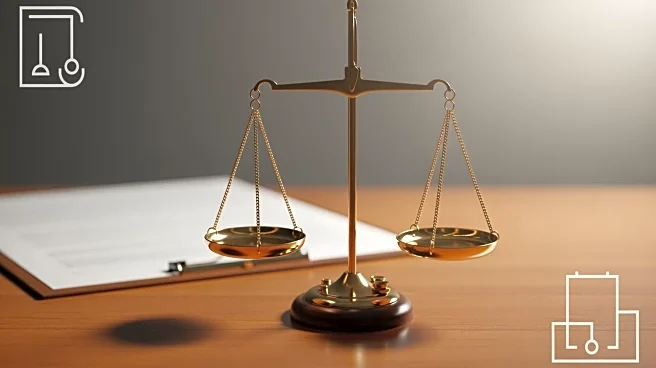What's Happening?
Nnamdi Kanu, leader of the proscribed Indigenous People of Biafra (IPOB), is set to begin self-defense in his ongoing terrorism trial at the Federal High Court in Abuja. Kanu has dismissed his legal team for the sixth time, including prominent Senior
Advocates of Nigeria, and has chosen to represent himself. The court, presided over by Justice Omotosho, has ordered the remaining members of Kanu's legal team to vacate the courtroom, allowing Kanu to proceed with his defense. The trial has seen multiple legal teams and judges over the years, with Kanu facing charges related to terrorism, treason, and illegal possession of firearms.
Why It's Important?
Kanu's decision to represent himself in court is significant as it highlights the complexities and challenges in his legal proceedings. The case has implications for Nigeria's legal system, particularly in handling high-profile cases involving separatist movements. Kanu's self-representation may impact the trial's dynamics, potentially affecting the prosecution's strategy and the court's proceedings. The trial's outcome could influence public perception of the Nigerian government's approach to dissent and separatism, as well as its commitment to legal fairness and transparency.
What's Next?
The court has adjourned the trial to allow Kanu time to prepare his defense. As Kanu begins his self-defense, the trial may see new developments, including potential delays or shifts in legal strategies. The involvement of high-profile witnesses, as indicated by Kanu's defense list, could further complicate proceedings and draw public attention. The trial's progress will be closely watched by stakeholders, including political leaders, civil society groups, and international observers, given its implications for Nigeria's political stability and legal integrity.
Beyond the Headlines
Kanu's trial raises broader questions about the rights of defendants to self-representation and the role of legal counsel in complex cases. It also underscores the tension between state security measures and individual rights, particularly in cases involving political dissent. The trial may prompt discussions on legal reforms and the need for transparent judicial processes in politically sensitive cases.















